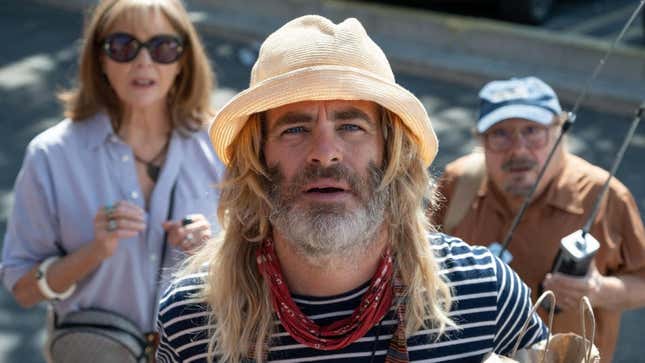
Movie stars will literally direct a whole movie about going to therapy instead of, you know, actually going to therapy. This could be the tagline for Chris Pine’s Poolman, a film that so deeply misunderstands what normal people like about the movies that it could have only come from someone who’s never done anything else.
If you clicked on this Poolman review, there’s a good chance it was out of morbid curiosity rather than any genuine, honest desire to sit through the excruciating 100 minutes of this movie. If not, here’s a quick catch-up: Pine debuted his attempt at a neo-noir satire at TIFF last fall, and the reviews were nothing short of abysmal. There were apparently numerous walkouts, and multiple mainstream outlets said it was not only the worst film of that festival season, but that it would probably be the worst film in any festival season in which it was released. Definitely not what you want to hear about your baby that was “born from a giggle, made with the softest of puppy Labrador licks to the face, and presented with a giant hug of compassion,” as Pine described the film at a recent screening in New York City.
We honestly feel kinda bad for the guy, so here’s another way to look at it: If you’re a cultural anthropologist, a psychiatrist to the stars looking to understand a little bit more about what the hell goes on in A-listers’ brains, or even just a regular old hater looking to engage in a little bit of schadenfreude, Poolman might be a valuable research tool for you. On a meta level, it’s genuinely kind of fascinating to reckon with the fact that sometimes, the stars aren’t just like us. On just about every other level, though, Poolman sinks long before it gives itself the chance to swim.
Poolman reads kind of like an episode of Community if Abed didn’t actually understand any of the movies he referenced. Pine stars as Darren Barrenman (get it? “Barren Man”?), a “long-haired manchild” who talks and dresses like a fifth grader and writes daily letters to Erin Brockovich (not Julia Roberts) on his typewriter. He cleans the pool at his shabby L.A. apartment complex (but literally only that one pool), engages in extremely awkward and painfully long post-coital banter with his girlfriend Susan (Jennifer Jason Leigh), crashes city council meetings to complain about the transportation options, and does it all over again the next day.
That is, until a mysterious femme fatale figure (DeWanda Wise, trying really hard to make this all work) shows up to alert Darren to a vague governmental conspiracy involving the city council official he’s been bothering for months (Stephen Tobolowsky), an incoming real estate development, and something about the city’s water. Pine and Ian Gotler’s script isn’t remotely concerned with the details, and you shouldn’t be either. The only thing that matters is that it’s just like Chinatown, a reference the movie bashes over its audience’s heads so frequently that one might start to wonder if Paramount, Chinatown’s distributor, inked some sort of bizarre product placement deal with Poolman’s producers.
Even though that obviously isn’t what happened, the free advertising is still coming directly out of Poolman’s pockets. The movie makes its terminal blunder somewhere in its first half hour, when it actually puts a clip of the Roman Polanski film on screen. From there, it’s hard to spend any of the next 100 minutes of origami, egg cream, and almond-centric bits (there are multiple instances of each) wishing for anything other than to be watching a real movie. Best Original Screenplay this is not.
It’s a shame, because there are definitely a few seeds of something workable here. The entire supporting cast—including Danny DeVito (playing an out-of-work filmmaker) and Annette Bening (a “Jungian therapist”) who serve as Darren’s surrogate parent figures—commit hard to their roles. There’s a fun cameo from Ray Wise, and there were some scattered moments that elicit real laughs. In one, Darren has a brief moment of something resembling actual characterization as he reacts to his best friend’s (John Ortiz) betrayal. Later, he cracks a genuinely funny joke about watching Brené Brown.
But these disparate giggles can’t make up for the fact that this movie was clearly made by Chris Pine, for Chris Pine. It’s not even really so much a movie, as a collection of things Chris Pine finds funny and interesting without even a whisper of a cohesive narrative to tie any of them together. In his talkback, for example, the actor-director explained that Tobolowsky’s character doubles as an Orthodox rabbi because he trained as one in real life, and the two actors once had a conversation about the Talmud. None of that is explained in the actual film, of course. The councilman is just randomly also a rabbi. The same is true for all those L.A. references, which are largely to things Pine “find[s] very personally important as an aesthete.” Hanna-Barbera makes an appearance because Pine found the studios beautiful as a kid. The story is the same for the long-ago demolished Garden of Allah hotel in West Hollywood. “This is a really dense film and I was told many times to cut it. I was like, ‘I just don’t want to cut it,’” he said. “I just find it very funny.” That much is clear.
If you’re a Chris Pine super-fan looking to live inside the actor’s head for a little while, Poolman just might be for you. But if you’re pretty much anyone else—even someone looking for some so-bad-it’s-good fun—take a lesson from the walkouts and stay out of the splash zone.